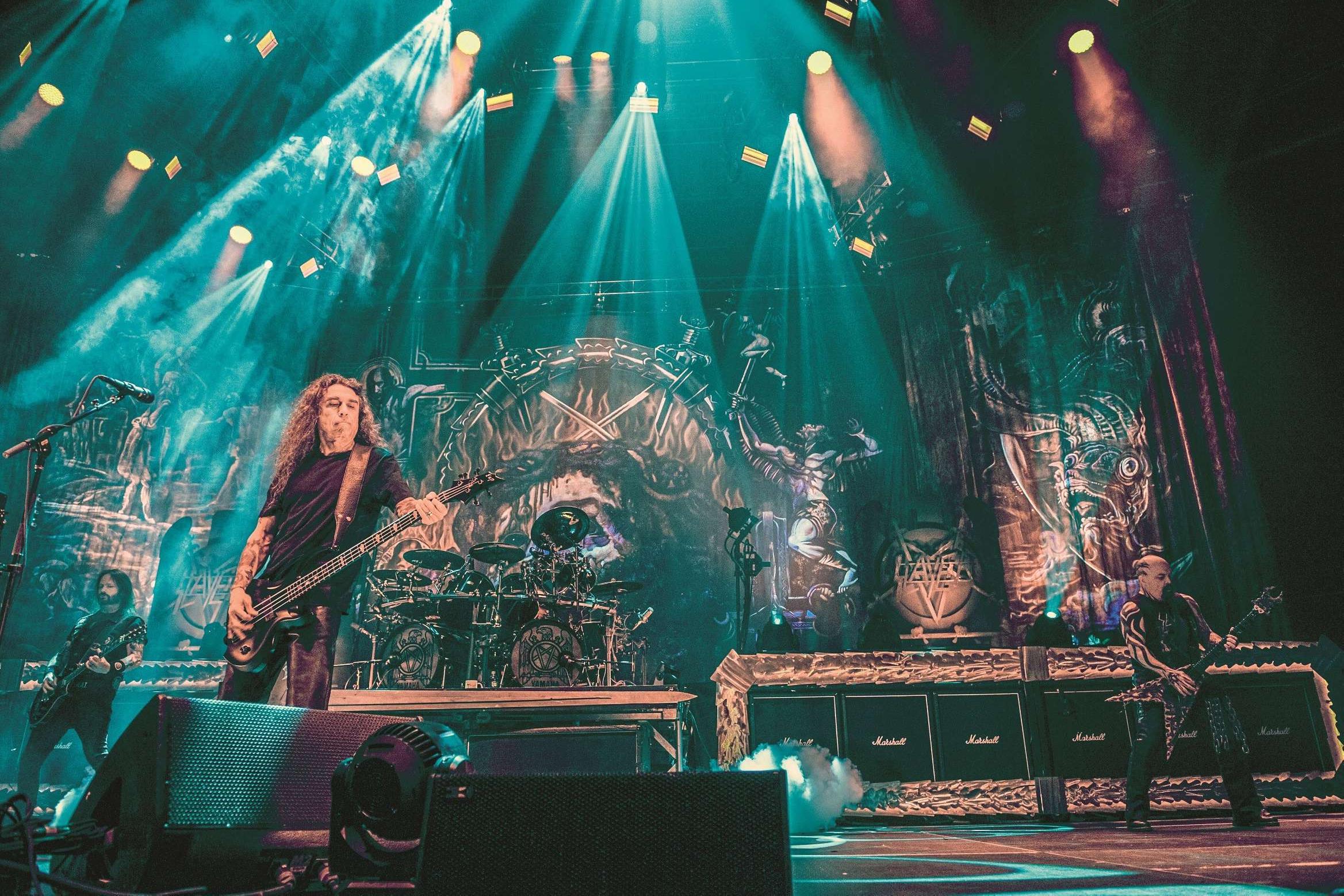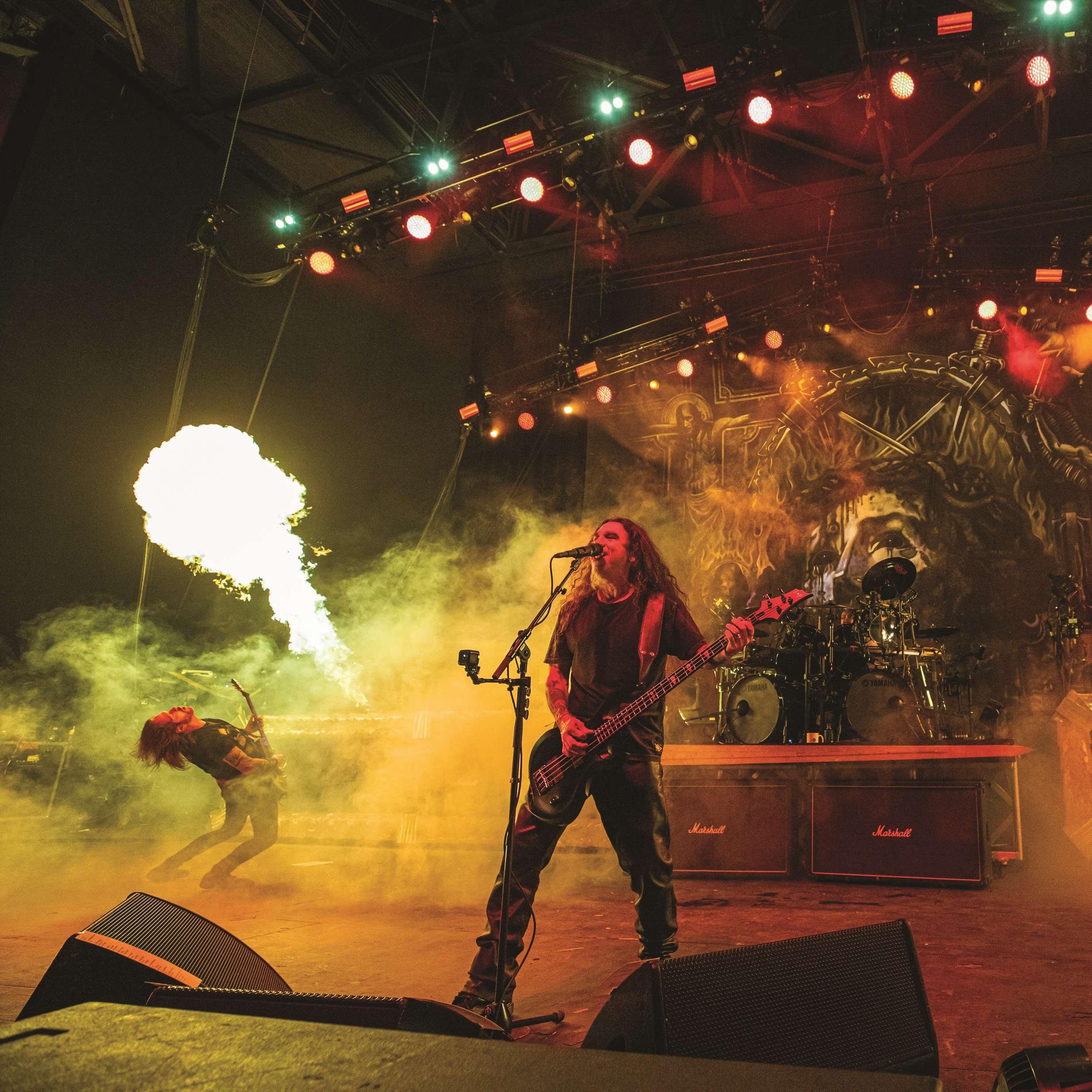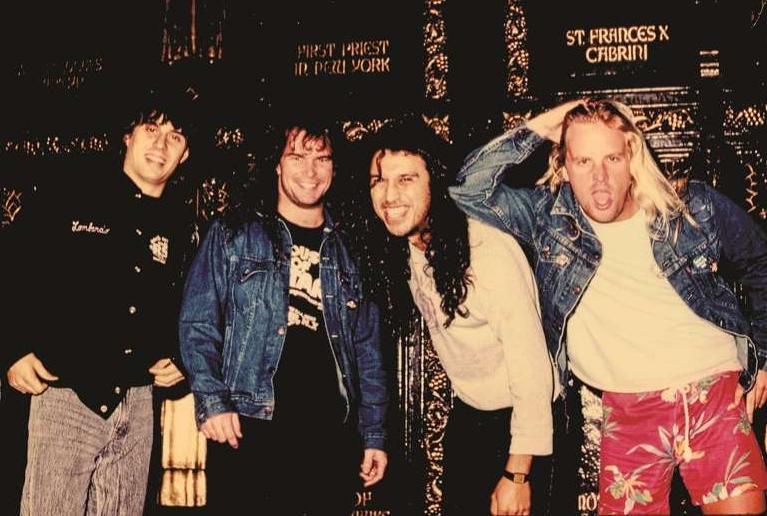
Steve Thorne / Redferns – Slayer
Slayer’s 140-plus date farewell tour makes a stop at Arena Birmingham in England Nov. 7, 2018.
Not only do bands come and go, many come and change. Previously edgy bands may get commercial, find God, change their sound or otherwise alienate core fans and somehow stray from what resonated with fans in the first place. Not Slayer.
“The best way to describe slayer is after 40 years of being Slayer, Slayer is still pretty damn scary to a lot of people. That’s the big difference,” says Gerardo Martinez of Nuclear Blast, the label that handled the band’s latest album, 2015’s Repentless. “Slayer is still super offensive and scary in 2019. That just goes to show who did the job right here.”
Regarded as one of the “Big Four” metal titans – which toured as such with Metallica, Megadeth and Anthrax for a super tour that took in stadiums in 2009-2010 – Slayer has never “sold out” or gone soft. They continue to scare people, and although had some rocky periods and tragically lost co-founding member Jeff Hanneman in 2013, they never broke up or had a notable hiatus.
Co-founded and continued by Kerry King and Tom Araya, the creative backbone of Slayer, the band pioneered and perfected heavy thrash in the early ’80s with landmark albums such as Reign In Blood and Seasons In The Abyss. Slayer remains a staple of heavy metal, known for never backing down and not being afraid to offend, perhaps with more of a flair for “blood, guts and Satan” than “sex, drugs and rock ’n’ roll.”
“It wasn’t even a mystique, it was a narrative,” manager Rick Sales says of the band’s more controversial content. “Jeff was in fact a big history buff, particularly conflict wars.
“The song that became sort of the touchstone for the issues was called ‘Angel of Death,’” Sales says of the track that kicks off 1986’s Reign In Blood, the song’s lyrics referencing Nazi physician Josef Mengele’s experiments at Auschwitz during World War II.
“If you actually read the lyrics, it did not condone the behavior, it was telling a story. That’s one of the things they were really great at, taking controversial topics and telling amazing stories with them.”
That song led to Columbia Records refusing to distribute the LP for Rick Rubin’s Def Jam imprint; eventually Geffen did distribute what would become for many the quintessential thrash metal album.
That mystique and heavy style of music, with pummeling tracks like “Altar of Sacrifice,” the grooving “Blood Red” and the always crushing “Postmortem,” may have fueled some rowdy fan behavior at concerts as well.
“There were a couple of incidents,” Sales says when asked about the band being banned at the Theatre at Madison Square Garden. “One of them – at a certain point in time, everyone was required to have seats on the floor, but the fans decided to use the seats to create foam frisbees, so they took all the foam out of the seatbacks and used them as frisbees.” Amid the chaos, “The promoter finally found me and said, ‘You gotta stop the show!’ I said, ‘What, are you crazy?’”

Scott Legato / Getty Images – Slayer
Michigan Lottery Amphitheatre in Sterling Heights, Mich., as part of its farewell world tour.
Sales didn’t stop the show, of course, which the New York Times described in its 1991 review as featuring fans setting off firecrackers and frontman Araya warning, “You Keep this up and we won’t be able to play at all!”
“The fans basically destroyed the place, and that wasn’t the only place they were banned from,” adds Pinnacle Entertainment’s Scott Sokol with a laugh, having represented the band for the last 20 years. Times have changed, at least a little, with Slayer coming back to the Theatre at Madison Square Garden in 2017.
“That was a fantastic show,” Sokol adds. “A lot of people were on eggshells that night because they thought something crazy could happen. But I think it’s different now and the fans are a little more respectful. For them to do that, then come back and do the larger building which will be sold out, it’s a good way to come full circle,” with the band headlining a sold-out Madison Square Garden Arena in November before its final two-night stand at the band’s Southern California hometown at the Forum.
Slayer’s story is one of resolve and persistence, doing what few metal bands are able to do – age gracefully while keeping their core edginess and integrity.
“I think if you’re conscious of it and you know what’s gotten you there and sticking to your guns and not giving in and going soft or whatever you want to call it, the fans picked up on it,” says Dino Paredes, the band’s longtime A&R exec who worked with Rick Rubin at Def Jam and is considered an integral part of the team. “They didn’t compromise and change their sound to be more commercial. They really stuck to their guns and did what they did. They had credibility with their fans and it was based on what they did musically.”
“They’ve always stayed true to what they were about,” adds Kristen Mulderig, also with Rick Sales Entertainment Group and working with the band just under 20 years. “Listen, you don’t want a band to make the same record over and over again, but that doesn’t mean you need to conform to what’s going on or do what people would say is selling out, but it’s about progressing and growing as songwriters. That’s what they were able to do but keep every inch of credibility. That’s something I hold in very high regard.”
In a way, such consistency made Slayer’s announcement of a worldwide farewell tour, starting in May 2018, that much more impactful. Something that people had loved and gotten used to wouldn’t be around forever. Someone who’s seen the impact first-hand is Ernie Gonzalez of Rick Sales Entertainment Group, who often travels with the band.
“About three years ago I went with them to Chile, where Tom was born and where he’s basically the heavy metal Paul McCartney,” Gonzalez says. “People were literally waiting for days. From the time we got there to the time we left, there were people in that lobby that I saw still wearing the same clothes just waiting and hanging out waiting to say hi to the band. Then, going to the show, it was a whole different experience. I’ve never felt the amount of energy, ever, and I’ve been to a million concerts, never felt the amount of energy as Slayer in Chile.

– Slayer
The band’s original lineup with Dave Lombardo, Kerry King, Tom Araya and Jeff Hanneman. Although losing founding member and songwriter/guitarist Hanneman in 2013, the band still pays tribute with a huge Heineken-style banner that instead reads “Hanneman.”
“The fans were louder than the band. The people in the rafters, the nosebleeds, were just as crazy as the people on the floor. I said I’m going to die if I stay here, and I walked right back down. You could feel the floor shaking, it was amazing. I can’t wait to go back this year.”
The farewell leg has seen notable grosses, including Papa Murphy’s Park in Sacramento (13,711 tickets, $715,760), SAP Center in San Jose (9,408, $597,042) and 3Arena in Dublin, Ireland, (10,643, $648,140). Three of the farewell shows were promoted by Live Nation regional president Geoff Gordon, whose time with the band goes back to Cellar Door Concerts with Jack Boyle in the early ‘90s. “The musicianship is at such an exceptional level, that although some would not appreciate the music at times, it’s hard to not appreciate the talent behind it,” Gordon says. “It’s an amazing body of work and amazing they do it in such a respectful and class way on this farewell tour.”
“They were always able to bring it live, and when you go to a Slayer show, no one walks away let down.” Mulderig says, describing a touching scene as the band did its final German show (and European show altogether) in Stuttgart Aug. 3, leaving fans in tears. “They’re the performers, this is their legacy and who they’ve been since they were teenagers, and that’s gotta be heavy, but Goddamn it what an accomplishment to look into that crowd and see all these people screaming, not wanting to leave. I felt proud watching it.”
That credibility, quality and close involvement from the band has led to a strong brand identity for Slayer as a product, with creative merchandise and product partnerships that may not be obvious at first (such as a Supreme skating and hip-hop streetwear line), and everything from custom liquor to snow globes (or “blood gloves) to BMX bicycles to a whole Scion car.
“There are only a handful of bands on the planet that are that iconic,” says Barry Drinkwater, who co-founded Bravado and now runs Global Merchandising, putting Slayer in a category with The Rolling Stones, Guns N’ Roses and Iron Maiden.
“They’re very focused on the quality of the products, between Tom and Kerry, and very into the design and development,” adds Drinkwater, who works with the band’s management for all merchandise and product partnerships globally, including live and retail. “We have a lot of input from them – how they want the graphics, everything from the color and depth of the saturation. It’s great to have so much involvement from the artists themselves.”
With merchandise and branding partnerships being a big part of an artist’s income, with more than $10 million worth of Slayer merch sold on the farewell tour so far with another leg to go, according to management, the Slayer fashion phenomenon may still have exceeded expectations.
“You’re not supposed to see Slayer shirts on Kardashians, or basketball players rocking Slayer T-shirts as they walk into the arena on TV. That wasn’t supposed to happen,” Ernie Gonzalez says. “If you said that 30 years ago, nobody could have fathomed that. The awesome thing is they never had to sacrifice any artistic integrity, never tried to tone themselves down to conform or meet the standards of what the music business feels is the best path to success.”
The band may have cemented its place as one of the big four by doing just that, hitting the road as part of the “Big Four” metal bands on tour with Metallica, Anthrax and Megadeth.

Gary Miller / Getty Images – Slayer
Kerry King
“They’re one of a kind,” says K2’s John Jackson, international agent for the band since ’80s brought on by Rick Rubin and Lyor Cohen. “Any band that has a guitar in it and wants to play loud and fast have taken their influences and continue to take their influences from Slayer.”
Like Metallica, which Jackson also represents, Slayer had worldwide appeal early, and Jackson says he’s particularly proud to have been part of the “Big Four” shows in 2010, including the opening Warsaw Sonisphere gig – “a big, big show with just a ridiculous amount of people.” Those shows were immortalized with a live DVD release from the Bulgaria stop, which charted at No. 1 in four different markets and gave Slayer its first platinum certification.
As such, although the band is saying farewell, its music and brand will live on, and it’s no small task to continue that as a going concern.
“We’re in legacy mode,” Mulderig says, “which is a lot to do, even though they won’t be making records or on the road. They still have their endorsers, there’s still merch and branding to do – sync licenses and who knows? Maybe coming up with some sort of event that is Slayer-based. This is all stuff we’re thinking about and talking about. Slayer lives on, absolutely.”




 Daily Pulse
Subscribe
Daily Pulse
Subscribe

